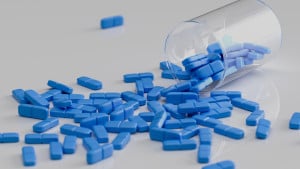Men’s adherence to ED medication

Erectile dysfunction (ED) is not something uncommon and sexual health is just as important as all the other aspects concerning our health.
In the past 20 years, there have been many epidemiological studies of men presenting ED.
There is emerging evidence of an association between ED and a variety of lifestyle factors, including obesity, smoking, and exercise.
An estimated 150 million men worldwide have some degree of erectile dysfunction, and more than twice that many are expected to be affected by 2025.
It is very important to preserve our sexual function, and the risks associated. Sexual function is closely linked with overall health and encourages increased self-surveillance and medical attention to late-life sexuality.
There are two main categories of ED: psychogenic ED and organic ED.
Young men, under 40 years, are more disposed to psychogenic erectile dysfunction. It involves a psychic component and it usually develops immediately after a psycho-traumatic and stressful situation. Anxiety is a sign that is strongly related to the onset of psychogenic ED.
Psychogenic dysfunction has the following characteristics:
- Problems in romantic relationships
- Sudden development of ED with a rare incidence of episodes
- No problems with spontaneous nocturnal erections
- Solving the problem that causes erectile dysfunction restores normal erectile function
On the other hand, organic erectile dysfunction is characterized by:
- Gradual development
- The hardness of the penis is not enough for coitus
- Erection is weakened during sexual intercourse
- It takes too long to achieve an erection
- Spontaneous nocturnal erections are absent
- Absence of erection when it’s needed.
Not being able to engage in sexual activity can lower your self-esteem and sense of well-being. Talking with your trusted healthcare professional is the first step to overcome the ED issues and managing it.
Optimal management of ED and its risk factors, as well as the management of ED comorbidities, is a challenge that is complicated by poor medication adherence.
A wide choice of medications is available now for the treatment of ED. These drugs belong to the class called the PDE-5-inhibitors and help increase blood flow to the penis. These drugs are usually the first method patients try, but they should not be used by men who take nitrates. Patients with slow drug absorption (e.g., Parkinsonian patients) may need to wait 2-3 hours for an erection to develop after taking PDE-5 inhibitors.
Some medications are known as to influence the erection function or even to induce ED.
Medication-associated ED is thought to be frequent, accounting for 25% of ED cases.
Poli-medication (the use of multiple medications), occurring in middle-aged and elderly men, was recently shown to be a contributing factor.
Many long-term medications for chronic conditions, most notably antidepressants, antihypertensives, and 5-a reductase inhibitors such as finasteride or dutasteride for Benign Prostate Hyperplasia or male pattern baldness, have sexual side-effects that include ED.
The most frequently prescribed PDE-5-inhibitors are:
CIALIS/tadalafil
Tadalafil is a drug belonging to the class of phosphodiesterase type 5 (PDE-5), considered the first line of treatment for ED.
The relatively long half-life of tadalafil (17.5 hours) allowed the confirmation of highest potency for PDE-5 inhibition, successful clinical development and subsequent regulatory approval of tadalafil.
Tadalafil is prescribed in four doses: 2.5 mg, 5 mg, 10 mg and 20 mg.
Generics with tadalafil, are also available, in different commercial names, and at a more convenient price.
Either original or generic, medicinal products with tadalafil require a prescription from your doctor.
VIAGRA/sildenafil
Viagra (sildenafil citrate) has been proven as the first choice of treatment for ED due to its producing rigid, sustained erection and rapid onset of action.
Sildenafil improves quality of life and satisfaction for treated men and is well tolerated with a favourable safety profile. New data suggest that sildenafil has beneficial effects in several chronic conditions. It has been approved for the treatment of idiopathic pulmonary hypertension. Numerous articles have suggested that it improves endothelial function and a possible role on premature ejaculation or treatment of lower urinary tract symptoms has been suggested.5 The conclusions of a study published in 2006 show that ‘Men treated with sildenafil for ED demonstrated improved erectile function and an increased intercourse success rate, which correlated positively with improvement in the Self-Esteem and Relationship (SEAR) questionnaire for self-esteem and sexual relationship.
SPEDRA/avanafil
Spedra is one of the newest treatments on the market for ED and differentiates itself by being quicker acting than Viagra.
LEVITRA/vardenafil
Levitra is a fast-acting medicine to treat ED.
Levitra is available in 5, 10 and 20mg tablets.
It can work in just 15 minutes, though normally takes effect in 30 minutes. Effects can last up to five hours.
Tadalafil, sildenafil, avanafil and vardenafil are all phosphodiesterase type 5 inhibitors and work in similar ways to enhance blood flow to the penis so a man with ED can get an erection firm enough for sex.
Are there any risks involved when using phosphodiesterase type 5 inhibitors?
Yes, please consider your degree of cardiac risks associated with your sexual activity.
If you are in the case of co-administering substances known to lead to symptomatic hypotension (blood pressure <90/50 mmHg), do not take any ED medication.
If using alpha- blockers, you should address to your doctor prior to taking ED medication.
Phosphodiesterase inhibitors cannot be administrated with nitric oxide donors or nitrated in any form (Nitro-glycerine Isosorbide, Nitroprusside, Amyl nitrite or amyl nitrate). Nitrate esters are commonly used in the treatment of angina pectoris, or “chest pain”, myocardial infarction, and congestive heart failure. The combination of nitrates and phosphodiesterase inhibitor can lead to a dangerous fall in your blood pressure.
Also, do not take nitrate-containing medicines up to 24 hours after you take a phosphodiesterase inhibitor.
If you are not certain, it is better to ask the doctor or the pharmacist.
Do not take ED medication if you are taking riociguat used to treat high pressure in the lungs and high pressure in the lungs secondary to blood clots, as their hypotensive effects may be increased by the ED medication.
If you have a severe heart problem of you suffered from a stroke or heart attack, or if you have a severe liver problem, it is better to refer to your doctor or pharmacist.
Treatment abandon
It can be the case that a certain medication will not work for you. That is a problem that often ends with treatment abandon. The causes for treatment abandon are often lack of response after treatment and adverse reactions.
In terms of treatment compliance, men should be encouraged by their treating physician to monitor the efficacy of the drug as well as stay attentive at any unpleasant effect that may appear at any dose.
Treatment or dose can be changed at any time if the doctor advises to.
Why do patients quit their treatment plan?
Different treatment plans were analysed in a recent study published in The Journal of Sexual Medicine.
European scientists examined men’s adherence to three different types of phosphodiesterase type 5 inhibitors: tadalafil taken once daily, tadalafil taken on demand, and sildenafil taken on demand. (Vardenafil was not included in this study.)
Seven hundred seventy patients were randomly assigned to one of the three treatment plans. For eight weeks, the patients took their designated medication with no changes, except for adjustments in dosage when necessary. After this period, the men could continue their current treatment, switch to another regimen, or stop treatment completely.
The conclusion of the study was that patients who took tadalafil (once a day or on demand) tended to stay with their treatment plan longer than the men taking sildenafil. Overall, 44% of the men continued with their assigned plan.
42% switched plans at least once.
Why? Efficacy played a role in the two most common reasons. Men either felt that their erections were not hard enough or did not last long enough. Some men did not like taking a pill every day; others did not like taking medication on demand.
Helping Patients Choose an ED Drug
When choosing an ED drug, much depends on a man’s preferences regarding sex occasions and drug administration. Some helpful questions to ask include the following:
This study looked at men’s adherence to ED medication. Some of these men felt that being constantly under the pressure of taking a pill, they felt that “medication controlled their sexual life”. Men with this concern may want to choose a different approach to treating ED.
Some men prefer a daily regimen because it’s easier to remember. Others may not like the idea of taking a daily pill and choose the on-demand route.
How important is spontaneity? In some regimens, the drug must be taken 30-60 minutes before sex. But often, a couple may not know when they’ll feel inspired. They may prefer to take advantage of unplanned moments, which might make another regimen more suitable for them.
The length of effectiveness is also very important. Each drug is effective for a different amount of time. Sildenafil and vardenafil may be effective for up to 5 hours. Tadalafil may last up to 36 hours. This factor can decide if a patient continues the treatment plan or not. If the erection becomes rigid enough, men will feel confident and will be less likely to give up on.
However, an estimated one-third of men stop taking the drugs after their first prescription due to lack of effectiveness. About one-half stop within six months.
Some men find that PDE5s are not as effective as they had hoped. Others stop taking the drugs because they or their partner have lost interest in sex or because the medications are too expensive.
Researchers from the Memorial Sloan-Kettering Cancer Centre in New York examined this issue further, focusing on the relationship between erection hardness and treatment adherence.
168 with ED participated in the study. The researchers used two study tools to assess the men’s erections at baseline and at 6-month follow-up points for at least twelve months: The International Index of Erectile Function (IIEF) and the Erection Hardness Scale (EHS).
The EHS uses a 4-point scoring system to determine the rigidity of an erection, with a score of 1 indicating severe ED and 4 describing a penis that is “completely hard and fully rigid.”
At the start of treatment, the men were instructed on how to take sildenafil. They were told to take the medication on an empty stomach and to expect an approximate 8-hour time frame for sexual activity. Adherence was defined as taking the drug at least once a month.
Under sildenafil, the men’s EHS scores improved with 46% reaching a 4-point score on the EHS scale. EHS score of 4.
82% of the men had at least a 1-point improvement in EHS score. 38% saw a 2-point improvement and 11% of the men had a 3-point improvement.
Overall, 67% of the men continued the medication at follow-up. Men who could achieve a score of 4 on the EHS appeared more likely to keep taking sildenafil. Men whose EHS scores jumped two points or more were also more likely to continue.
Partners played an important role in medication adherence. Frequent sexual activity and having a partner, especially one that was at least ten years younger, were predictors of continued sildenafil use. “The fact that having a partner is related to adherence to PDE5 treatment emphasizes that partners should be involved in ED discussions regarding ED management,” the authors noted.
The researchers also recommended, “driving patients to a greater rigidity” and aiming for an EHS score of 4. This could lead to fewer men dropping out of the treatment program.
When the use of ED drugs might become a concern?
The use of Viagra became a concern when there was evidence that healthy people are starting to use it a recreational drug or as a neuroenhancer, that means to stimulate brain processes.
That is similar to doping in sport and it is not recommended or approved.
Drug misuse studies were conducted and they revealed the fact that Viagra is used ‘’off-label” to counterbalance the effect of difficult penile erection caused by the use of other illicit drugs, for example, and even by people not suffering from erectile dysfunction to obtain better sexual performances.
This phenomenon was compared to one of the athletes who make use of doping substances based on their belief that most of their competitors are also doping and their fear that they can only win with the support of performance enhancers. Similarly, young people use cognitive enhancers and recreational drugs because they believe that others are doing the same and that they must do so to remain competitive.
ED drugs appear to be used quite often by healthy young men and in the gay community together with other illicit drugs. In a survey conducted in London nightclubs, the responders taking Viagra as recreational drug reported positive effects for enhanced sexual desire and lovemaking.
Negative effects, such as headaches, genital soreness, and intoxication were overlooked and surprisingly, all responders said they would take the drug again, which had been obtained from friends, dealers, sex shops, and the internet.
Take home messages
- Medication adherence is very important for avoiding negative clinical outcomes associated with advancing ED and its comorbidities.
- The ED early diagnosis and treatment may promote medication adherence and better management of diseases that are comorbid with ED, improving outcomes and decreasing costs.
- Appropriate ED management may have beneficial effects on diseases that are comorbid with ED, and vice versa, most likely via shared pathophysiological pathways.
- Similarly, because ED is sometimes a silent marker and predictor of comorbidities such as cardiovascular disease and may provide a window of opportunity for the prevention of future cardiovascular events, men presenting with complaints of ED should be screened, monitored, and appropriately treated for diseases that are comorbid with ED.
- Phosphodiesterase 5 inhibitors serve an important purpose for men who have been deemed healthy enough to use them for treatment of erectile dysfunction
- Switching different treatment plans is the best way and probably the only way of knowing what is the best option for you.
- Lowering or increasing doses can also be recommended by your doctor to find the dose that best suits you.
- Clinicians should consider men’s health overall, of which sexual health is a central component, to provide optimal disease management.
- Erectile dysfunction drug misuse can result in serious consequences and should be avoided.
- Serious or persistent side effects must be reported immediately to your doctor.
What if I experience a problem?
If you are intending to use ED medication, or if you have questions related to side-effects, please address directly to our pharmacy and to our doctor at phone 01625 460 621.
Always follow the directions on your prescription label carefully. Also, make sure to ask your doctor or pharmacist to explain anything you don’t understand. Take these drugs exactly as indicated.
For any question related to ED drugs, their prescription and delivery please consult our site or write us an email at [email protected].
References
- Ayta IA, McKinlay JB, Krane RJ. The likely worldwide increase in erectile dysfunction between 1995 and 2025 and some possible policy consequences. BJU Int. 1999;84:50-56.
- Marshall BL. Science, medicine and virility surveillance: ‘sexy seniors’ in the pharmaceutical imagination.
- DiMatteo MR, Giordani PJ, Lepper HS, Croghan TW. Patient adherence and medical treatment outcomes: A metaanalysis. Med Care 2002;40:794–811.
- Keene LC, Davies PH. Drug-related erectile dysfunction. Adverse Drug React Toxicol Rev 1999;18:5–24.
- https://www.ncbi.nlm.nih.gov/pmc/articles/PMC2699643
- Steidle CP. Correlation of improved erectile function and rate of successful intercourse with improved emotional well-being assessed with the Self-Esteem And Relationship questionnaire in men treated with sildenafil for erectile dysfunction and stratified by age.
- Anach-Navarrete J, Morales-Giraldo A, Ferrandis-Cortés C, García-Morata F,Pastor-Lence JC, Martínez-Jabaloyas JM. Satisfaction and treatment adherence in erectile dysfunction in the medium and long term. Actas Urol Esp. 2017 May;41(4):258-266. doi: 10.1016/j.acuro.2016.09.011. Epub 2016 Nov 16. English,Spanish. PubMed PMID: 27865471.
- https://www.sexhealthmatters.org/erectile-dysfunction/mens-adherence-to-erectile-dysfunction-ed-drugs
- https://www.issm.info/news/sex-health-headlines/erectile-rigidity-and-treatment-adherence/
- https://prostate.net/articles/why-are-so-many-men-misusing-erectile-dysfunction-drugs
- Jane C. Lucke et al. Academic doping or Viagra for the brain http://embor.embopress.org/content/12/3/197
- https://www.technologynetworks.com/neuroscience/news/viagra-could-now-be-available-without-prescription-294685




